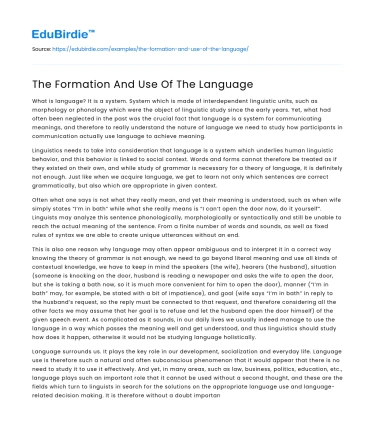What is language? It is a system. System which is made of interdependent linguistic units, such as morphology or phonology which were the object of linguistic study since the early years. Yet, what had often been neglected in the past was the crucial fact that language is a system for communicating meanings, and therefore to really understand the nature of language we need to study how participants in communication actually use language to achieve meaning.
Linguistics needs to take into consideration that language is a system which underlies human linguistic behavior, and this behavior is linked to social context. Words and forms cannot therefore be treated as if they existed on their own, and while study of grammar is necessary for a theory of language, it is definitely not enough. Just like when we acquire language, we get to learn not only which sentences are correct grammatically, but also which are appropriate in given context.
Save your time!
We can take care of your essay
- Proper editing and formatting
- Free revision, title page, and bibliography
- Flexible prices and money-back guarantee
Often what one says is not what they really mean, and yet their meaning is understood, such as when wife simply states “I’m in bath” while what she really means is “I can’t open the door now, do it yourself”. Linguists may analyze this sentence phonologically, morphologically or syntactically and still be unable to reach the actual meaning of the sentence. From a finite number of words and sounds, as well as fixed rules of syntax we are able to create unique utterances without an end.
This is also one reason why language may often appear ambiguous and to interpret it in a correct way knowing the theory of grammar is not enough, we need to go beyond literal meaning and use all kinds of contextual knowledge, we have to keep in mind the speakers (the wife), hearers (the husband), situation (someone is knocking on the door, husband is reading a newspaper and asks the wife to open the door, but she is taking a bath now, so it is much more convenient for him to open the door), manner (“I’m in bath” may, for example, be stated with a bit of impatience), and goal (wife says “I’m in bath” in reply to the husband’s request, so the reply must be connected to that request, and therefore considering all the other facts we may assume that her goal is to refuse and let the husband open the door himself) of the given speech event. As complicated as it sounds, in our daily lives we usually indeed manage to use the language in a way which passes the meaning well and get understood, and thus linguistics should study how does it happen, otherwise it would not be studying language holistically.
Language surrounds us. It plays the key role in our development, socialization and everyday life. Language use is therefore such a natural and often subconscious phenomenon that it would appear that there is no need to study it to use it effectively. And yet, in many areas, such as law, business, politics, education, etc., language plays such an important role that it cannot be used without a second thought, and these are the fields which turn to linguists in search for the solutions on the appropriate language use and language-related decision making. It is therefore without a doubt important and much needed in linguistics to think and study language in use, better serving not only the linguistic community, but also society at large.






 Stuck on your essay?
Stuck on your essay?

